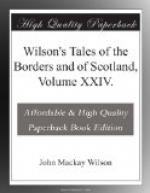Strange guests were revelling at the princely hall—
Proud peers and ladies fair; but, chief of all,
A rich and haughty knight, from Beaumont side,
Who came to woo fair Helen as his bride;
Or rather from her father ask her hand,
And woo no more, but deem consent command.
He too was young, high-born, and bore a name
Sounding with honours bought, though not with fame;
And the consent he sought her father gave,
Nor feared the daughter of his love would brave
In aught his wishes, or oppose his will;
For she had ever sought it, as the rill
Seeketh the valley or the ocean’s breast;
And ere his very wishes were expressed,
She strove to trace their meaning in his eyes,
Even as a seaman readeth on the skies
The coming breeze, the calm, or brooding gale,
Then spreads the canvas wide, or reefs the sail.
Nor did he doubt that still her heart was free
As the fleet mountain deer, which as a sea
The wilderness surrounds; for she had grown
Up as a desert flower, that he alone
Had watched and cherished; and the blinding pride
Of wealth and ancestry had served to hide
From him alone, what long within the vale
Had been the rustic gossip’s evening tale.
That such presumptuous love could e’er employ
The secret fancies of the cottage boy,
He would have held impossible, or smiled
At the bold madness of a thought so wild—–
Reading his daughter’s spirit by his own,
Which reared an ancient name as virtue’s throne,
And only stooped to look on meaner things,
Whose honours echoed not the breath of kings.
XI.
Wild were the passions, fierce the anguish now,
Which tore the very soul, and clothed the brow
Of the Enthusiast; while gaunt despair
Its heavy, cold, and iron hand laid bare,
And in its grasp of torture clenched his heart,
Till, one by one, the life-drops seemed to start
In agony unspeakable: within
His breast its freezing shadow—dark as
sin,
Gloomy as death, and desolate as hell—
Like starless midnight on his spirit fell,
Burying his soul in darkness; while his love,
Fierce as a whirlwind, in its madness strove
With stern despair, as on the field of wrath
The wounded war-horse, panting, strives with death.
Then as the conflict weakened, hope would dash
Across his bosom, like the death-winged flash
That flees before the thunder; yet its light
Lived but a moment, leaving deeper night
Around the strife of passions; and again
The struggle maddened, and the hope was vain.
XII.
He heard the maidens of the valley say,
How they upon their lady’s wedding-day
Would strew her path with flowers, and o’er
the lawn
Join in the dance, to eve from early dawn;
While, with a smile and half deriding glance,
Some sought him as their partner in the dance:
And peasant railers, as he passed them by,
Laughed, whispered, laughed again, and mocked a sigh.
But he disdained them; and his heaving breast
Had no room left to feel their vulgar jest,
For it ran o’er with agony and scorn,
As water dropping on a rock was borne.




